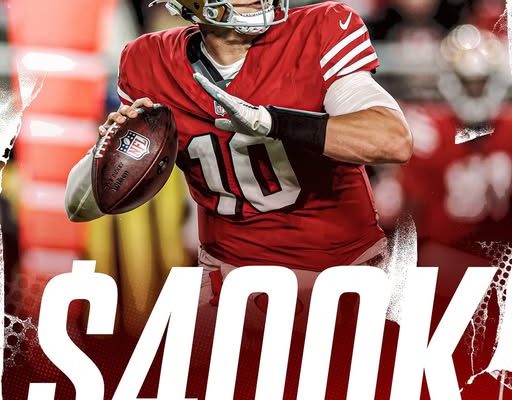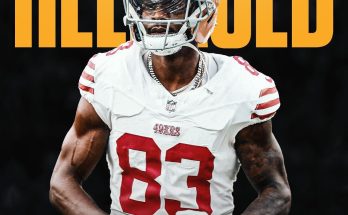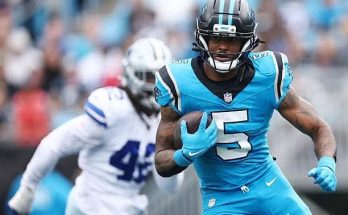Mac Jones, once viewed as a fading star in New England, has flipped the script in San Francisco, notching his fourth win with the 49ers and securing a new contract that cements his place in the team’s immediate future. It’s a storyline few predicted a year ago. After a rocky tenure with the Patriots, a team that never seemed to fully commit to developing him post-Brady, Jones has found not just redemption, but resurgence, under Kyle Shanahan. His recent performance has not only silenced critics but reignited conversations about what Jones can be when placed in a system designed to highlight his strengths. The win column now reads four, but the narrative around Mac Jones is so much bigger than that number. It’s about vindication. It’s about a second chance. And now, it’s about a bag.
When Jones was traded to the 49ers, it didn’t exactly shake the NFL world. It was more a whisper than a roar, viewed by many as a low-risk insurance move by a team already stacked with talent. Brock Purdy was entrenched as the starter. Sam Darnold was in the room. Trey Lance was a ghost of a former investment, already shipped off to Dallas. And yet, quietly, Jones got to work. No drama, no headlines—just tape study, reps, and integration into Shanahan’s complex system. And then came the opportunity. Whether through injury, inconsistency, or necessity, Jones was called upon, and he delivered.
Four wins may not seem like much, but context is everything. These weren’t hollow victories against bottom-feeders. Jones executed under pressure, against playoff-caliber defenses, with poise that reminded some of his rookie season. His timing with receivers like Brandon Aiyuk and George Kittle has sharpened. His decision-making has become more assertive. And perhaps most notably, his confidence—once chipped away in New England by poor line play and revolving offensive coordinators—has returned. There’s a visible calm to him now, the kind that comes from being trusted. Shanahan isn’t known for handing over the keys easily, but in recent weeks, he’s let Jones take the wheel more and more, and the offense hasn’t missed a beat.
Behind the scenes, the organization had already begun reassessing Jones’ role. Sources close to the situation indicate that the 49ers had quietly initiated contract talks even before the fourth win, impressed not just by the stat sheet but by the leadership he brought to the locker room. Jones, to his credit, didn’t posture or play hardball. He’s well aware of what this opportunity represents—a rare second chapter in a league that usually writes players off quickly. And now, he’s been rewarded. The deal reportedly includes significant guaranteed money, signaling that this isn’t a temporary bandage. San Francisco is betting on Mac Jones, at least in the short term, to be part of their quarterback calculus.
The bag, as it’s being called online, isn’t Mahomes-level astronomical, but it’s substantial. It’s a commitment. And in today’s NFL, that’s everything. Especially for a quarterback once pegged as a system player, someone who didn’t have the arm strength or improvisational flair to hang with the elite. Jones has heard it all. Too safe. Too stiff. Too reliant on structure. And yet, structure is precisely what he’s been given in San Francisco—and he’s thriving within it. He doesn’t need to be Josh Allen or Lamar Jackson. He needs to be accurate, quick, and smart. And right now, that’s what he is.
What makes this turnaround even more compelling is the complete 180 in public perception. In New England, Jones was vilified by some as the symbol of post-Brady regression. Patriots fans, hungry for a new dynasty, turned sour quickly when the wins didn’t come. The revolving door of offensive coordinators didn’t help, nor did the lack of weapons. It was a toxic situation dressed in red, white, and blue. But now? He’s smiling again. He’s playing free. He’s winning.
Teammates have taken notice, too. Trent Williams, the All-Pro left tackle, recently praised Jones for his command in the huddle and his attention to detail in film sessions. Deebo Samuel has noted that Jones is “a different dude” than what people saw in New England. There’s a vibe shift around Jones, and in a locker room like San Francisco’s—where culture is as important as talent—that matters.
The question now is: what’s next? With this fourth win, the playoff picture begins to take sharper shape, and with it, the possibility that Jones might not just be a fill-in or a fallback, but a legitimate starter heading into the postseason. Shanahan, always tight-lipped about depth chart decisions, hasn’t confirmed anything yet. But actions speak louder than pressers. Giving Jones this extension, this financial and symbolic vote of confidence, is a loud action.
That doesn’t mean the quarterback carousel is stopping. The NFL is a week-to-week league. One bad game can change the entire tone of a season. But right now, the trend lines are all pointing upward for Mac Jones. And for a player who was all but discarded, that’s remarkable.
The narrative arc is a familiar one—young quarterback drafted into a legacy organization, burdened by unrealistic expectations, chewed up and spit out by the relentless machine of fan discourse and media hot takes. But the ending? That part feels fresh. Because Jones didn’t just disappear. He didn’t accept the backup label quietly and fade into the background. He learned. He adapted. He waited. And when the moment came, he took it.
There’s something old-school about this path. In a league obsessed with flash and potential, Jones is winning with the basics. Timing. Accuracy. Preparation. It’s not sexy, but it’s effective. And that effectiveness just got him paid.
From a broader lens, this moment also reopens the debate about quarterback development in the NFL. How much of a young QB’s success is talent, and how much is circumstance? If Jones had started his career in San Francisco instead of New England, would we be talking about him as a top-ten guy already? The system matters. The coaching matters. And for all the talk of intangibles and “it factor,” what often determines success is fit. Jones fits here. And now, he has a platform—and a contract—to prove it long-term.
This story isn’t just about football. It’s about growth, both personal and professional. Jones didn’t lash out during his Patriots downfall. He didn’t blame teammates. He didn’t burn bridges. He just kept working. And when a new door opened, he walked through it prepared. That’s a lesson a lot of athletes—and honestly, a lot of people—can learn from.
As the 49ers gear up for the rest of the season, Jones’ emergence gives them options. Maybe Brock Purdy comes back healthy and takes over again. Maybe he doesn’t. Maybe this becomes a full-on quarterback competition next offseason. But regardless of how that plays out, Jones has earned his spot at the table. He’s no longer just a contingency plan. He’s part of the equation.
Of course, the noise will return. Every QB who wins in a high-profile environment becomes a target. Expectations will rise. So will scrutiny. The next loss will bring questions. The next interception will bring doubt. That’s the nature of the position. But Jones has already shown he can weather the storm. And with this new deal, he’s got more than just job security—he’s got validation.
When the final whistle blew on that fourth win, it wasn’t just a stat in a box score. It was a statement. Mac Jones is back. Maybe not as a superstar, not yet. But as a quarterback who belongs. Who can win. Who can lead. And who just secured a bag to prove it.



